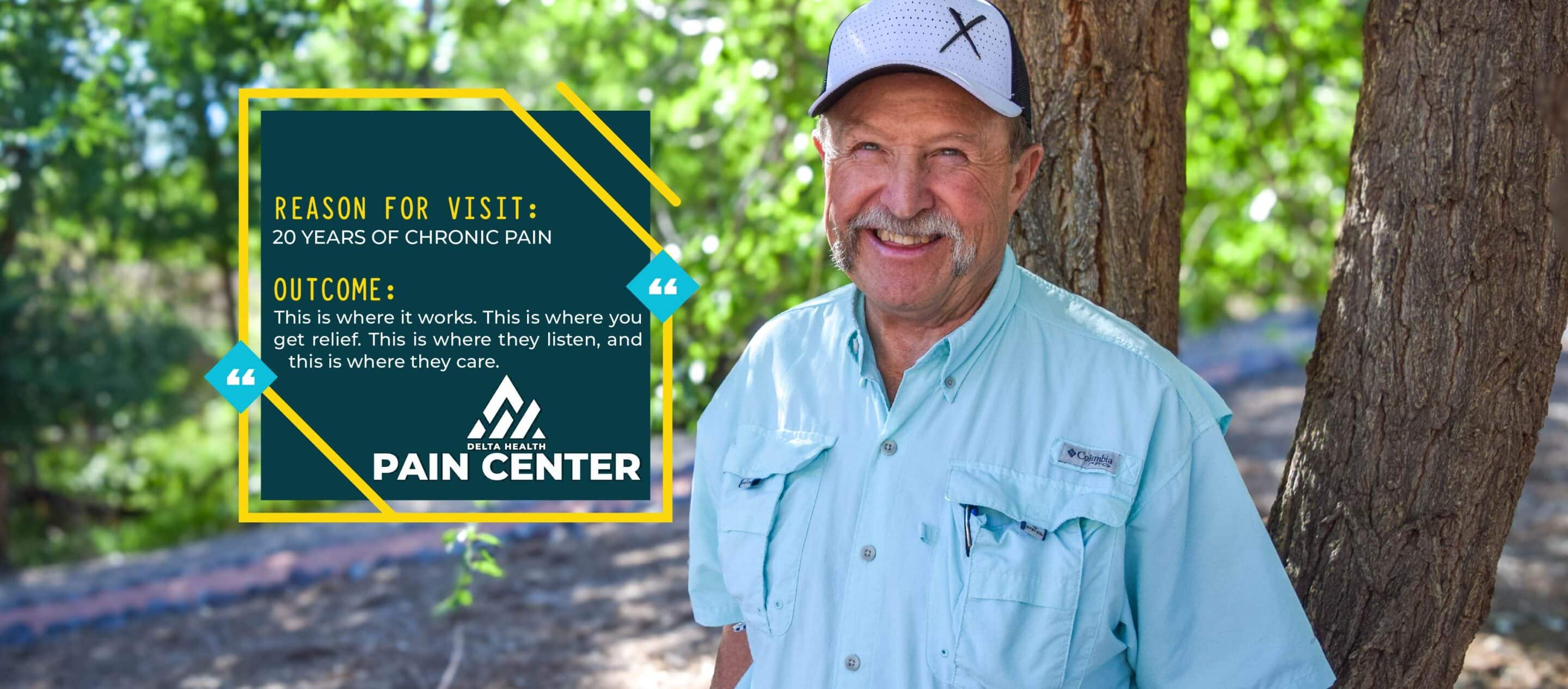Over 50 million people in the United States experience chronic pain that affects their daily life, says the Centers for Disease Control. Chronic pain looks different for everyone, and for William “Snub” Liles, his journey is one that took years to navigate.
Originally from Las Vegas, New Mexico, Snub and his wife moved to Cedaredge almost 30 years ago. Snub was a veterinarian by trade before tearing the rotator cuff in his right shoulder nearly 20 years ago. At the time he was told that the procedure to repair it would only take 45-minutes and that with rehab he would be back using it within six to eight weeks.
“The 45-minute surgery turned into a four and a half hour surgery with nerve damage and the sutures in the rotator cuff torn out,” said Snub. “The pain when the surgery was completed was the worst pain I have ever experienced. A neurologist was called in and I was immediately referred to a pain doctor for treatment, but that was the first clue to me that the prognosis was very poor.”
At Snub’s initial visit with the pain physician, he was told that he could learn to live with the pain and manage it, or that he could constantly complain and alienate his family and potentially break up his family.
“That to me was a good indicator that she felt it wasn’t going to get better, and she was correct.” Said Snub.
During this time of recovery, Snub and his wife had started ranching and were in the process of starting a practice for collecting embryos and transferring them to recipient cows. His father was helping to get that running and they bought cattle and equipment to run the operation, but things just weren’t getting better.
“I kept thinking things would get better if I just moved on and used my arm, but that wasn’t so,” said Snub. “After a few years, my dad was in poor health and I couldn’t work through the pain enough to keep going. In the meantime my wife had gotten a real estate license, and we decided to sell the [embryo transfer business] and I got a license as well.”
Over the years, Snub’s chronic pain in his shoulder kept progressing. He had three level surgical fusion on his neck and the remainder of the cervical vertebrae collapsed, causing severe facet syndrome, an arthritis-like condition that causes pain in the neck and back.
“It was very disappointing [switching careers] because up to that point in my professional career, I had been able to work through broken ribs, broken legs, fingers, a previous torn rotator cuff and other issues by just keeping on – but this time it didn’t work that way,” said Snub. “It didn’t do good to dwell on the current situation when it couldn’t be helped, and I had always been taught that when I felt sorry for myself, I should look around and I could quickly find someone in worse shape than I was. And that is really true – it helped me put my issues into perspective.”
But it turns out that all hope was not lost when Snub started receiving pain treatment at the Delta Health Pain Center.
“Over these years, I’ve been to different doctors and clinics all over the state of Colorado, and have had very little relief from the pain,” said Snub. “I got an immediate result when I started getting treated at the Delta Health Pain Center.”
Joe McBeain, Certified Registered Nurse Anesthetist (CRNA) and Nonsurgical Pain Management (NSPM), has been treating Snub with a comprehensive and integrated approach. Joe completed a fellowship in Advanced Pain Management, and while in the Navy, was a member of the acute pain management service. This training allows McBeain to recognize the complexities of chronic pain.
“Joe has been great at looking at all different aspects of the pain and not just using cookie-cutter treatments,” said Snub. “The most important thing to remember is that I get relief. That is not what has happened over the years. You can only take so many pain medications and that does not cure or treat the pain, it just diminishes it.”
McBeain explains that people often think pain has a single source; however, it is unlikely for a patient to have just one source of pain.
“There are many confounding factors required to adequately treat pain in addition to medication management, injection therapies (such as epidural steroid injections) and behavioral health plus physical therapy are integral to managing chronic pain syndromes,” said McBeain. “When used together, patients can receive optimum, individualized attention and care for their pain-needs.”
Snub’s started treatment about three years ago and has used a combination of methods including the epidural spinal injections and radio frequency ablations on his spine.
When dealing with chronic pain, it can be difficult to advocate for your health and get the treatment that you need.
“It’s hard for someone to look at you and tell you where pain originates, the cause of pain, and how severe,” said Snub. “People vary in their definitions and severity of pain, but you have to have a healthcare person that you can communicate with and that will listen to what you have to tell them. The best advice I have for people is to find someone that will actually look for the cause [of the pain] as opposed to just cookie-cutter treatments.”
Having the support of family and loved ones is also an important part of life with chronic pain. Although not easy or fun for family and those involved, their support also helped Snub on his healing journey.
Today, Snub enjoys spending time with his family and grandkids. He and his wife will be celebrating 50 years together next May. They have three grown children, seven granddaughters and one great-granddaughter.
“I don’t want to go see anyone else [for my pain],” said Snub. “This is where it works, this is where you get relief, this is where they listen, and this is where they care. I have been all over and the Delta Pain Center is where I got help. I feel like I am very fortunate that I found relief under my own nose.”
The Delta Health Pain Center is located at 236 Cottonwood Street in Delta. For more information, call 970.546.4010 or visit deltahealthco.org/delta-health-pain-center/.



